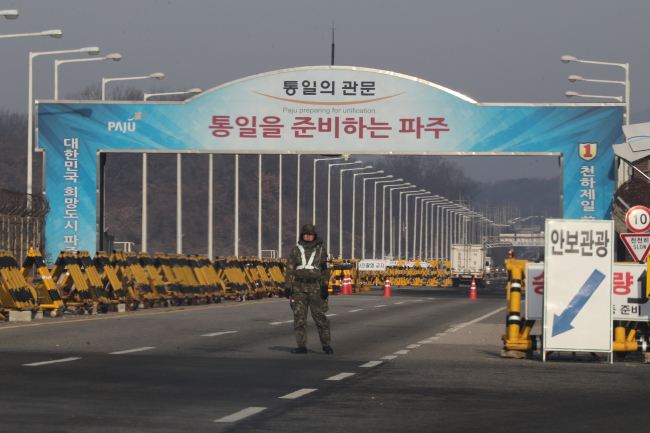Scope of inter-Korean talks raises questions, communications remain slow
By Choi He-sukPublished : Jan. 4, 2018 - 16:50
With the two Koreas resuming communications, the focus is turning to the scope of high-level talks proposed by South Korea.
On Tuesday, Seoul proposed high-level talks, and Pyongyang responded with unexpected speed by restoring the inter-Korean communication line at Panmunjom the following day.
On Tuesday, Seoul proposed high-level talks, and Pyongyang responded with unexpected speed by restoring the inter-Korean communication line at Panmunjom the following day.

In the preparation of the talks, and the talks themselves, Seoul’s Ministry of Unification appears likely to take the lead. Although the ministry is tasked with handling inter-Korean affairs, the presidential office had taken point during the conservative Park Geun-hye administration.
President Moon Jae-in, in contrast, has emphasized the role of the Unification Ministry on a number of occasions, and again ordered the ministry to take steps to resume talks at Tuesday’s Cabinet meeting.
The talks and the delegation, however, will also be affected by North Korea.
The ministry expects Unification Minister Cho Myoung-gyon to take the lead in the talks, if Ri Son-gwon leads Pyongyang’s delegation.
Ri heads North Korea’s organization for inter-Korean affairs and is said to be a key associate of Kim Yong-chol, the head of Pyongyang’s intelligence agency.
“The chief delegate needs to be selected through talks with the concerned ministries, but it appears likely (that Cho will be selected) at the moment,” a Unification Ministry official told reporters Thursday. He added that the composition of the delegation will be influenced by “the agenda, and characteristics of the talks.”
“Factors such as the time, location and agenda of the talks are open for now. (The ministry) will monitor the North’s responses with regards to what kind of talks will be held.”
Ri’s announcement on Wednesday appeared to hint that the agenda will focus on North Korea’s participation in the PyeongChang Olympic Winter Games.
In announcing the decision to reopen communications with the South, Ri said that North Korean leader Kim Jong-un called for a “serious and earnest stance” in discussing the regime’s participation in the games.
However, Ri’s announcement left open the possibility of discussions on a wider range of issues, and hinted at Pyongyang’s discontent at the involvement of Seoul’s allies.
“(Kim Jong-un) stressed that whether inter-Korean relations are improved to meet the hopes of the people is entirely dependent on how the Koreas’ authorities handle the matter,” Ri said.
While the Moon administration and the ruling party welcomed Wednesday’s developments as the first step in improving relations, some have raised concerns that Pyongyang may make difficult demands.
Pyongyang has long demanded that Seoul end joint military drills with the US, and hopes to be recognized as a nuclear-armed state.
Communications, however, may be moving at a pace slower than hoped by Seoul.
Since the 20-minute call initiated by the North at 3:30 p.m. on Wednesday, during which the two sides checked the communication line for faults, there have been no real developments.
The South and North have been in contact on four occasions since -- at 6:07 p.m. Wednesday and three times on Thursday -- but the conversations served little more than to verify the channel’s operation.
According to Seoul’s Ministry of Unification, the North’s second call on Wednesday was to inform the end of communications for the day. At 9:30 a.m. on Thursday, North Korean officials simply stated that there were no developments to relay. The North repeated the statement when contacted by the South at 4 p.m., before calling back at 4:30 p.m. to end the day‘s communications.
(cheesuk@heraldcorp.com)







![[KH Explains] How should Korea adjust its trade defenses against Chinese EVs?](http://res.heraldm.com/phpwas/restmb_idxmake.php?idx=644&simg=/content/image/2024/04/15/20240415050562_0.jpg&u=20240415144419)












![[Today’s K-pop] Stray Kids to return soon: report](http://res.heraldm.com/phpwas/restmb_idxmake.php?idx=642&simg=/content/image/2024/04/16/20240416050713_0.jpg&u=)